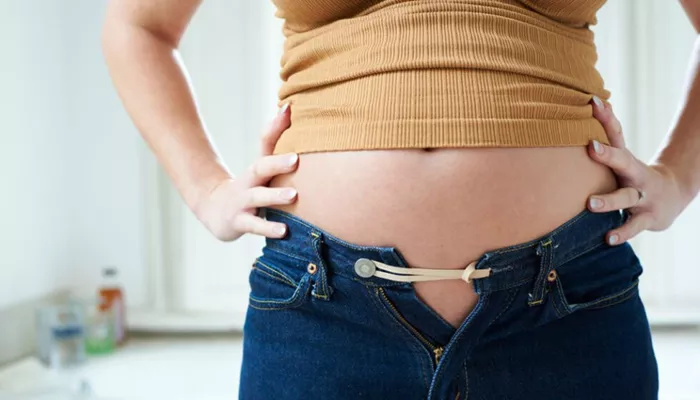Menopause is a natural process that marks the end of a woman’s reproductive years. It is characterized by a variety of symptoms, including hot flashes, night sweats, and mood changes. One of the most common symptoms of menopause is bloating, which can cause discomfort and affect quality of life. In this article, we will explore the causes and treatment options for menopause bloating.
Causes of Menopause Bloating
Hormonal Changes
- Hormonal changes associated with menopause, including a decrease in estrogen levels, can contribute to menopausal bloating.
- Estrogen helps regulate fluid balance in the body, and a decrease in estrogen levels can cause fluid retention and bloating.
- Progesterone, another hormone that decreases during menopause, can also cause bloating by slowing down digestion and causing gas buildup.
Changes in Digestion and Metabolism
- Aging can cause changes in digestion and metabolism that contribute to menopausal bloating.
- Slowed digestion can cause food to remain in the digestive tract for longer, leading to gas buildup and bloating.
- A decrease in muscle mass and physical activity can also contribute to slowed digestion and metabolism, leading to bloating.
Dietary Factors
- Dietary factors can also contribute to menopausal bloating.
- Consuming too much salt can cause fluid retention and bloating.
- Consuming processed foods or foods high in sugar or fat can also contribute to bloating by slowing down digestion and causing gas buildup.
Medical Conditions
- Certain medical conditions can also contribute to menopausal bloating.
- Irritable bowel syndrome (IBS), a common digestive disorder, can cause bloating, gas, and abdominal pain.
- Other medical conditions, such as liver or kidney disease, can also cause fluid retention and bloating.
Medications
- Certain medications can also contribute to menopausal bloating.
- Hormone replacement therapy (HRT), a common treatment for menopausal symptoms, can cause bloating as a side effect.
- Other medications, such as antidepressants or pain medications, can also cause bloating as a side effect.
Lifestyle Changes to Help Menopause Bloating
- Eating a healthy, balanced diet that is high in fiber and low in salt and carbonated beverages can help reduce menopause bloating.
- Staying hydrated by drinking plenty of water and other fluids can also help reduce menopause bloating.
- Regular exercise, such as walking or yoga, can help improve digestion and reduce menopause bloating.
- Stress reduction techniques, such as meditation or deep breathing, can also help reduce menopause bloating.
Medical Treatments for Menopause Bloating
Over-the-Counter Medications
Over-the-counter medications, such as antacids or gas relief products, can help relieve menopause bloating.
Antacids work by neutralizing stomach acid, which can help reduce bloating and discomfort.
Gas relief products, such as simethicone, work by breaking down gas bubbles in the digestive tract, which can help reduce bloating and discomfort.
Prescription Medications
Prescription medications, such as hormone replacement therapy (HRT), may be recommended to regulate hormonal changes associated with menopause and reduce bloating.
HRT works by replacing the estrogen and progesterone hormones that decrease during menopause, which can help regulate fluid balance in the body and reduce bloating.
Other prescription medications, such as progestin-only contraceptives or selective serotonin reuptake inhibitors (SSRIs), may also be recommended to help regulate hormonal changes and reduce bloating.
Probiotics
Probiotics, which are beneficial bacteria that live in the gut, may also help reduce menopause bloating by improving digestion.
Probiotics work by restoring the natural balance of bacteria in the gut, which can improve digestion and reduce bloating.
Probiotics can be found in fermented foods, such as yogurt or kefir, or taken as a supplement.
Dietary Changes
Making dietary changes can also help reduce menopause bloating.
Eating a healthy, balanced diet that is high in fiber and low in salt and processed foods can help reduce bloating by improving digestion and regulating fluid balance in the body.
Staying hydrated by drinking plenty of water and other fluids can also help reduce bloating by flushing out excess fluids in the body.
Alternative Treatments for Menopause Bloating
- Herbal supplements, such as ginger or peppermint, may help reduce menopause bloating by improving digestion and reducing inflammation.
- Acupuncture, a traditional Chinese medicine practice that involves inserting thin needles into specific points on the body, may also help reduce menopause bloating.
- Massage therapy, which involves manipulating the muscles and soft tissues of the body, may help improve digestion and reduce menopause bloating.
Conclusion
Menopause bloating is a common symptom of menopause that can cause discomfort and affect quality of life. Hormonal changes associated with menopause, changes in digestion and metabolism, and dietary factors can all contribute to menopause bloating. Lifestyle changes, such as eating a healthy diet, staying hydrated, regular exercise, and stress reduction techniques, can help reduce menopause bloating. Medical treatments, such as over-the-counter or prescription medications, and alternative treatments, such as herbal supplements or acupuncture, may also help reduce menopause bloating. By working with a healthcare provider and exploring different treatment options, women can manage menopause bloating and improve their overall quality of life.
Related topics:


